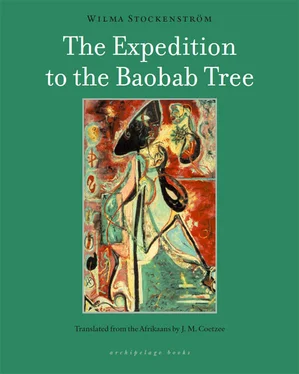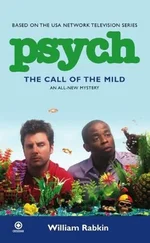I don’t know. This I know: that I allayed fear and terror in and through my dreams and that thereby I rendered harmless the nameless, the formless. But I had to learn to do that. It was the outcome of affliction. It is something I still do.
This I know: that I was not condemned as these people were, because on the day of my arrival, so I was told, I, the only girl captured, exempted from chains, wandered away from the others, shot down to the sea and picked up a white shell and a black shell. For I am of water. I know what turns the air to water. Then, so they say, it began to rain. Rain, rain drizzled down.
I turned my back on the damned. I was the head slave girl of the richest man here. I had more power than many a wife. Love of ease characterized my life. A lazy contemplation of the stupidity of others, that I could afford, with the symbol of my owner’s pleasure in me around my arm like a reprimand to those who would like to humiliate me. Even if the bouts of depression came too often, too often, I gritted my teeth: it dared not get the upper hand. My existence was pomp and circumstance, was sparkle and excitement, was shining rippling water over a bed of pebbles, was secret well water’s blessing upon the lips, was sea water’s beneficence and power.
Like a baby laid on its stomach, curling its spine as it tries to curl upright, so the hammerhead shark had struggled.
Hurriedly, seeing blind, I went over to the dead one and buried him in the sand with my hands, and on my knees sat before the little grave and cried and did not stop. It brought me no relief. I did not stop.
I cannot remember that, since coming to live in the baobab, I have ever cried so bitterly. From rage, yes, often. From frustration, at the beginning, when I was still struggling to light a fire, the knack of the friction-stick escaping me and the spark simply not leaping. Or when, unequipped stupid civilized creature, I tried to search out tubers in the tracks of baboon and warthog, food intended only exceptionally for the human system, as I was to discover with sorrow when stomach cramps made me writhe in pain. I ate locusts — the hoppers. Exulted when I chanced on a jackal food flower that porcupine and baboon had missed. I disdained my nose’s warning and in a sweat dug the fruit out, only to bring up before I could put my mouth to the gruesome brown musky bluebottle lure. I get sick when I think of it. I get glassily sick. I pulled grass stalks out of their protective leaves and chewed the juicy white lower points. I tried to steal birds’ eggs, but was too clumsy a climber. I did not even get to the nests. I did not have the sharpness of vision to discern ground nests in the grass veld.
In time I grew emaciated and dulled. My weakness affected my sight. Plants, trees, stumps, stones, antheaps changed before my cloudy gaze into billowing lines that resolved themselves in frighteningly beautiful arrangements and left me floating and penetrated my sleep, for now I slept most of the time, I slept on the heaving colors, they made for rest in their restlessness, I did not try to control them, they washed lovingly over me, rolled me considerately over, I bathed in them and sighed contentedly.
Then I got up, wide-awake, and wandered about like a fool in the paradisal luxuriance. This was a garden! Let me acquaint myself with it. To the eye uncared for and full of thorns, full of brambles. Let me inspect again. The berries hid mischievously. I had to learn the game better. A clusterleaf offered winged fruit. But was it for me? Was it a clusterleaf? Let me walk further in the waves of heat, in the visible unfamiliar abundance. Every tree was a tree full of whistling. It made me light-headed. The noise. The exuberance. The confidence. The crazy-colored buntings frisking about.
I discovered a creeper with orange-red fruit full of thick spines that had wound itself around a tree, and its fruit seemed to me so pretty, so enticing, but I was sure they would be poisonous, I was sure they were not for me. Let me rather pass by. Nevertheless, I turned back and approached and picked one. Perhaps I should just try. I dared not. It was a bitter-apple of death, be warned. The fruit hung so nicely. I broke off the point of a spine. The flesh was light green. I pressed my tongue carefully to it and registered a pleasant taste. I tasted more of it. Ate it up. And for days waited to be sick. Then ran joyfully to the tree where the divine creepers grew and picked all the fruit and ate it all up, even those the birds had pecked. To this fruit I wanted to give a name. But I could not think of anything suitable. I called it the red spine fruit of the twining plant that in the winter adorns the camel’s foot tree against the rise over there. I was far too scared to take honey out of the nest in the top of my home so as to store away provisions for the winter. I devised plans, oh yes, I thought myself to distraction, but I remained frightened. To be hungry and to know of a source of food and not to be able to get it.
To be hungry like the beggars in the city were, and the other outcasts, like the lepers banned to the bush and those who got pox and were rejected, and the lame and the crippled, those who tried to get by with a wooden stump, the blind with turned-over eyes and a child to lead them and help ask for alms. I gave nothing. I possessed nothing and could give nothing. With distaste I looked away. They pursued me with the fury of the desperate and stretched out their hands to me and looked at me urgently; they were so obtrusive, so dirty and full of sores. I was not my owner, and particularly not his eldest son, who scattered handfuls of cross money in the mud, on which the beggars descended as greedily as gulls, fighting over it and kicking up a comical hubbub. An uproarious, squalid, frenzied struggle for life would then take place in the streets on the outskirts of the city. In which I had no part. It was as if they were ready to bite and tear one another, peck one another till blood came. Here I was simply an unwilling spectator. In my time of hardship earlier … Admittedly I was looked after. I regularly got a bite to eat, that is true. There was an airy palm-frond roof over my head that leaked miserably in the rainy season and was never repaired. I had cotton clothes, threadbare with age, to cover my nakedness. I could exist. Admittedly. Certainly. Despite. In dullness I nosed around and kept body and soul together by drudgery. In tedium went on. Admittedly, that too was life. One of the slave girls in service with my second owner became bosom friends with me, and we tried to help each other as far as we could. She preferred laundry, I cooking. We ignored the other slave girls and divided the work as it suited us, even though it made them berate us, we knew they would gain nothing by going to complain to the man who owned us. To him we were all identical labor units. The two of us had wonderful jokes about him. We discussed his ugly habits to the finest detail, for example fiddling with himself or getting up halfway through intercourse to go and make water outside. Perhaps he suffered from incontinence. My bosom friend and I went into paroxysms over him and his nose-in-the-air wife, the old dry one, the old barren one.
Our children were plump and thriving in poverty, and we made no distinction between hers and mine. She carried mine on her back, I hers. She suckled mine, I hers. I was midwife to her, she to me. A child was a child to us. A warm little body in our arms, a dribbling little mouth searching for the nipple, the one’s fat little neck as pretty as the other’s, the one’s teething as annoying as the other’s. We brought them shells to play with, plaited a reed rope for them to skip with. Such a warm community, we and the infants. When it was my turn to cook I pinched some of the coconut milk and smuggled it back to them; and she in turn took them along to the washing stones at the river where they could make a mess undisturbed. Such a satisfying, lovely fullness that made up for so much in our shabby lives.
Читать дальше












